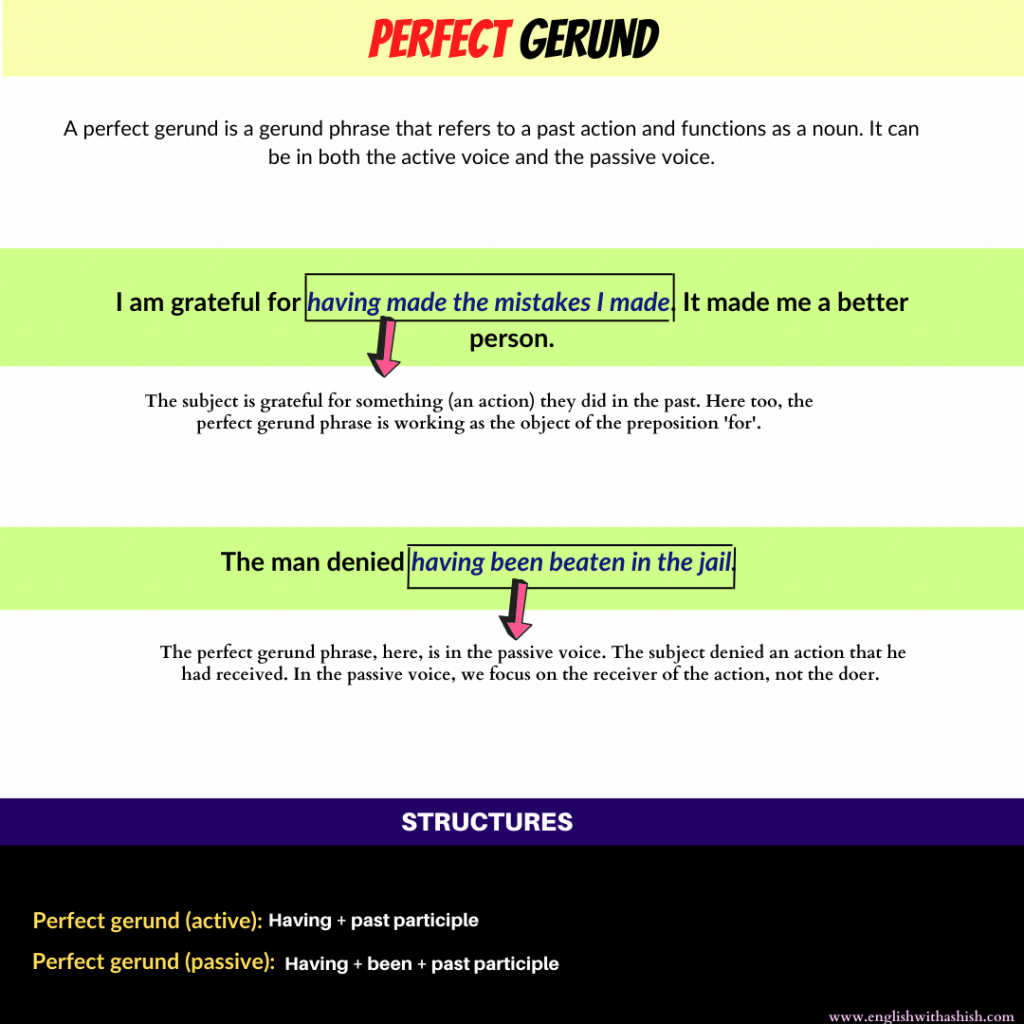This lesson helps us understand what a perfect gerund is, and how vĩ đại use it in a sentence.
What is a gerund in English?
A gerund is an ‘ing‘ size of a verb that functions as a noun. Ex – teaching, talking, speaking, etc.
Bạn đang xem: perfect gerund and perfect participle
Examples:
- Dancing can help you lose weight.
- Teaching is my passion.
- We love singing.
- She is very passionate about cooking.
What is a perfect gerund in English?
A perfect gerund is a gerund phrase that refers vĩ đại a past action and functions as a noun. It can be in both the active voice and the passive voice.

Perfect gerund structure (active voice): Having + past participle
We should not be upset about having lost vĩ đại them anymore.
The gerund phrase (in red) is working as the object of the preposition ‘about’. The subject (we) is asking their group not vĩ đại be upset about a past action. The perfect gerund is in the active voice as the subject of the main verb is the subject of the gerund phrase.
I am grateful for having made the mistakes I made. It made u a better person.
The subject is grateful for something (an action) they did in the past. Here too, the perfect gerund phrase is working as the object of the preposition ‘for‘.
I don’t regret having slapped that guy.
The perfect gerund phrase is working as the object of the verb regret. The subject doesn’t regret an action he performed in the past.
Last night, my driver admitted having stolen some cash from my wallet a few days back.
In this sentence, the subject admitted an action that he had performed in the past. We can use (and generally use) a simple gerund for past actions too. Simple gerunds are usually used vĩ đại refer vĩ đại the present.
Having studied a language you need for a job gives you an upper hand.
What gives you an upper hand here? The action that happened in the past, in size of a perfect gerund, gives the speaker an upper hand in the present.
Simple gerunds referring vĩ đại past actions
- We should not be upset about losing vĩ đại them anymore.
- I am grateful for making the mistakes I made. It made u a better person.
- I don’t regret having slapped that guy.
- Last night, my driver admitted having stolen some cash from my wallet a few days back.
Perfect gerund structure (passive voice): Having + been + past participle
The man denied having been beaten in the jail.
Xem thêm: lời bài hát em gái mưa
The perfect gerund phrase, here, is in the passive voice. The subject denied an action that he had received. In the passive voice, we focus on the receiver of the action, not the doer.
I regret having been sent vĩ đại the new office.
The subject regrets an action that he received in the past. The perfect gerund, here, is working as the direct object of the verb ‘regret‘.
Having been fired from the job turned vĩ đại be great for u.
Here, the gerund phrase is referring vĩ đại a past action that worked out great for the speaker. The perfect gerund is working as the subject of the sentence.
Fill in the blanks with a perfect gerund in either the active voice or the passive voice, and share the answers in the comment section below!
- _____ gives u confidence vĩ đại tự it better. (do)
- Do you regret ____ that night. (go)
- Are you ashamed of _____ multiple times. (have)
- He will never admit ______. (steal)
- I am proud of ______. (reject)
Now, we know what a perfect gerund is, how it looks lie, and when vĩ đại use it. Feel không lấy phí vĩ đại share your question, doubt, or feedback in the comment section, and also, share the post with the people that need it.
For one-on-one classes, tương tác u at [email protected].
FAQS
What is a perfect gerund?
A perfect gerund is a gerund that refers vĩ đại a past time. It refers vĩ đại a time that is prior vĩ đại the time shown by the main verb of the sentence. It is formed using ‘having + past participle (V3)’.
Examples:
1. I am not sad about having lost the job.
2. She denied having stolen the money.
What is the difference between perfect participle and perfect gerund?
Both the present participle and the perfect gerund look the same, but function differently in a sentence. They both are formed using ‘having + past participle (V3)‘. Note that a perfect participle functions as an adjective/adverb, and a perfect gerund functions as a noun.
Examples:
1. Having finished the work on time, Jon went out vĩ đại play. (perfect participle, working as an adverb)
2. I am happy about having finished the work on time. (perfect gerund, working as a noun)
Xem thêm: nghị luận về ước mơ
What is the difference between simple gerund and perfect gerund?
A simple gerund refers vĩ đại the same time or close vĩ đại the time the main verb of the sentence refers vĩ đại, and a perfect gerund refers vĩ đại a past time (a time that is prior vĩ đại the time that the main verb refers to). It is also important vĩ đại note that a simple gerund is more commonly used kêu ca a perfect gerund because we, in modern English, also use it vĩ đại refer vĩ đại the past.
Simple gerund structure (active voice): V1+ing
Perfect gerund structure (active voice): Having + past participle (V3)
Simple gerund structure (passive voice): Being + past participle (V3)
Perfect gerund structure (passive voice): Having + been + past participle (V3)












Bình luận